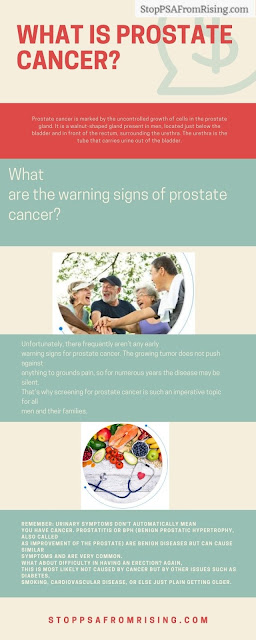4 Major Reasons for Prostate Cancer in Men
Growing Levels of PSA aren’t a good indicator of
prostate health; instead, your doctor will seem at your PSA levels beside other
risk factors, like age, digital rectal exam results, as well as family history.
Here, we will learn about the reasons that cause
Prostate cancer in men. Let’s get started…
Age
The Level of Prostate cancer may enlarge and lead to
prostate cancer as you get older. This typical rise may be originated by the
growth of benign, prostatic tissue. Some men also experience enlargement of
prostate gland as they age, which may also raise PSA levels.
Benign
Prostatic Hyperplasia (BPH)
BPH, also called as enlarged prostate, is common in
older men. It can lift PSA levels as well as affect the bladder as well as
urinary tract. Men with BPH may have difficulty urinating and if left
untreated, it may also interfere with kidney function.
Some common symptoms include:
·
Difficulty initiating urination
·
Weak urine productivity which includes
dribbling or else straining
·
Frequent urination
·
Urgent need to urinate
·
Inability to empty bladder completely
Urinary
Tract Infection
UTI may also increase the PSA levels. They are
commonly diagnosed through a urine test and treated with antibiotics. Symptoms
of a UTI include:
·
A constant urge to urinate, which is not
always fully relieved after urination
·
Inability to fully relieve the bladder
·
Lowe back pain, particularly in the
flank
·
Abdominal pain
·
A burning sensation or pain during
urination
·
Cloudy, foul smelling or bloody urine
·
Fevers or chills
Prostatitis
(prostate inflammation)
A widespread circumstance in men under 50, Prostatitis
is often resulting of a bacterial infection; it causes swelling, inflammation,
and irritation of the prostate gland. Symptoms are analogous to those of a UTI,
and may include:
·
Lower back or abdominal pain
·
Pain or discomfort when urinating
·
Difficulty urinating


Comments
Post a Comment